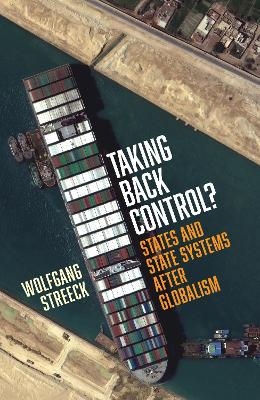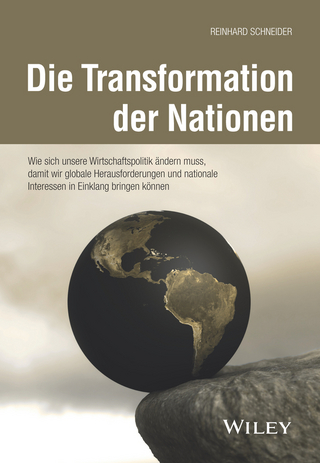
Taking Back Control?
Verso Books (Verlag)
978-1-83976-729-6 (ISBN)
The era of hyperglobalization once hailed as the 'end of history' was characterised by boundless capitalist expansion. The neoliberal revolution gave rise to a politics of scale aimed at the centralization and unification of states and state systems: the replacement of national with global governance or, in Europe, of the nation-state with a supranational superstate, the European Union.
The 'New World Order' proclaimed by the United States in the wake of the Soviet collapse proved to be ungovernable by democratic means. Instead, it was ruled through a combination of technocracy and mercatocracy, failing spectacularly to provide for political stability, social legitimacy and international peace. Marked by a series of economic and institutional crises, hyperglobalization gave rise to various kinds of political countermovements that rebelled against and ultimately stopped the upward transfer of state authority in its tracks.
This book analyses the ongoing tug-of-war between the forces of globalism and democracy, of centralization and decentralization, and unification and differentiation of states and state systems, and how they are tied to the advance of global capitalism and the prospects for its social and democratic regulation. Exploring the possibility for states and the societies they govern to take back control over their collective fate, the book is an attempt at a renewed theory of the state in political economy. Inspired by the work of Karl Polanyi and John Maynard Keynes, it discusses the potential outlines of a state system allowing for democratic governance within and peaceful cooperation between sovereign nation-states.
Wolfgang Streeck is Director Emeritus at the Max Planck Institute for the Study of Societies in Cologne. He is a member of the Berlin Brandenburg Academy of Sciences and a Corresponding Fellow of the British Academy. His books include Buying Time, How Will Capitalism End? and Critical Encounters.
Introduction: Political Economy beyond Globalism: States, War, and Capitalist Democracy
Part I: The Demise of Centralism
1. Global Politics and Regional Planning
The Neoliberal Interlude
A Critical Moment
2. The Demise of the New World Order
Globalisation and Hyperglobalisation
A New European Order: The European Union
Forever Unfinished
3. Stuck: Between Globalism and Democracy
What Next? A Tug of War
Left Globalism
Culture versus Unculture
Democracy as a De-proletarianised Value System
4. Breaking the Deadlock: Democracy and the
Politics of Scale
Economic Crisis and State Systems
Megalomania?
Decomposing Complexity
Part II: After Three Decades
5. A Dual Crisis I: Capitalism
Stagnation
The Neoliberal Crisis Sequence
The Central Bank State as the Last Stage of Neoliberalism
Keynes from the Ashes?
Debt without Remorse?
The Emergency State
Clueless
The Great Uncertainty
Capitalism and Nothing Else
6. A Dual Crisis II: Democracy
States between Democracy and Globalism
Globalism against Democracy
Democracy against Globalism
Post-globalist Democracy?
Part III: States and State Systems
7. Integration and Differentiation
Gibbon: Unity or Diversity?
The Contemporary State System: A Survey
Metamorphoses of the Nation-State
Statehood and the Constitutive Particularism of
Human Socialisation
Excursus I: Scotland and Catalonia
Excursus II: Germany in Comparison
'Taking Back Control'
Confederation or Empire?
The Dimensions of States and State Systems, and their Political Economy
8. The European Union: From Neoliberal to Geopolitical Integration
Europe as Battleground and Place of Desire
Before Ukraine: Critical Fault-Lines, Impending Failure
More Unity through Less Unity?
Integration by Militarisation?
After Ukraine
Liabilities Old and New
Beyond Superstate and Empire
Learning from Europe
Part IV: Beyond Globalist Centralisation
9. Mega-statism and Its Limitations
The Contradictions and Limits of Neoliberal Globalisation:
Eight Theses
Globalisation and Hyperglobalisation
Global Market Economy, National Democracy
Unity from Above: Global Governance
Global Governance as Technocratic Utopia
Another Plan A
Global Governance as Liberal Empire
COVID: The (Long-Hidden) Costs of Globalisation
COVID and the Fiscal Crisis of the State: A Conjecture
10. Small-Statism and Its Possibilities
Simon: Decomposing Complexity
Keynes: National Self-Sufficiency
Deglobalisation and Alternative Development
Global Polycentrism
Disentanglement: COVID and the Supply Chains
The Keynes-Polanyi State: National, Sovereign, Democratic
Better Smaller
'Economic Patriotism': Globalism and Back
Big Crisis, Small States
The Question of Money
Democratic Particularism and Global Collective Goods
Cooperative, Not Imperial: A Prospect of a New International Order
Epilogue
Index
| Erscheinungsdatum | 13.11.2024 |
|---|---|
| Übersetzer | Ben Fowkes, Joshua Rahtz |
| Zusatzinfo | 32 charts |
| Verlagsort | London |
| Sprache | englisch |
| Maße | 153 x 234 mm |
| Gewicht | 550 g |
| Themenwelt | Sozialwissenschaften ► Soziologie |
| Wirtschaft ► Allgemeines / Lexika | |
| Wirtschaft ► Volkswirtschaftslehre ► Wirtschaftspolitik | |
| ISBN-10 | 1-83976-729-4 / 1839767294 |
| ISBN-13 | 978-1-83976-729-6 / 9781839767296 |
| Zustand | Neuware |
| Haben Sie eine Frage zum Produkt? |
aus dem Bereich


